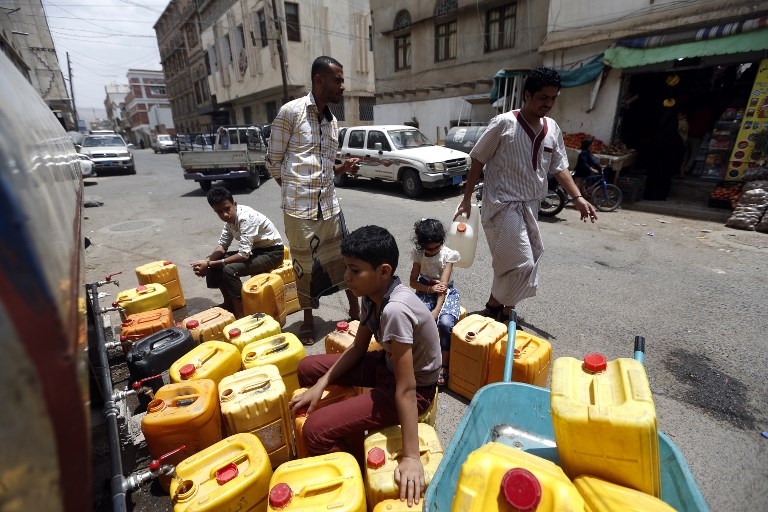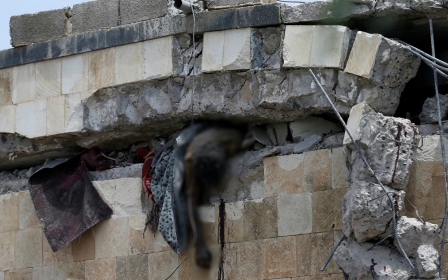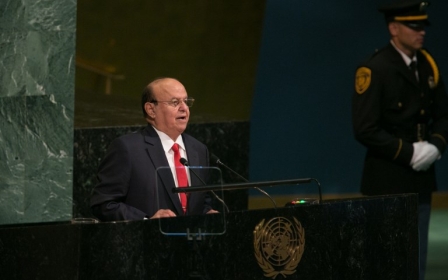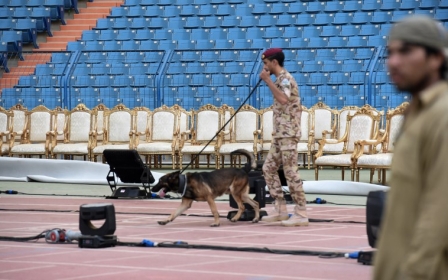Saudi-led naval blockade turns Yemen into a 'humanitarian disaster': HRW

The Saudi-led coalition’s blockade of Yemen has worsened an already dire humanitarian situation for Yemeni civilians, according to Human Rights Watch (HRW).
The coalition has diverted fuel tankers, closed a critical port, and stopped life-saving goods for the population from entering seaports controlled by the opposing Houthi-Saleh forces, said HRW, adding that the restrictions are in violation of international humanitarian law.
HRW said that Houthi-Saleh forces who control Yemen’s capital Sanaa have also blocked and confiscated aid, and restricted the movement of ill civilians and aid workers.
“The Saudi-led coalition should end its unlawful restrictions on imports to Yemen, and Houthi-Saleh forces should stop interfering with aid,” said Bill Van Esveld, senior children’s rights researcher at HRW.
Before even more children suffer and die of preventable causes, the warring parties need to allow fuel, food and medicine to reach the families that need it
- Bill Van Esveld, senior children’s rights researcher at HRW
“Before even more children suffer and die of preventable causes, the warring parties need to allow fuel, food, and medicine to reach the families that need it.”
The war has triggered one of the world’s largest humanitarian crisis in what is already the region’s poorest country.
An estimated 1.8 million children are now acutely malnourished, and with 15.7 million without access to clean water, the country has been gripped by a cholera epidemic that Oxfam has said is the worst on record. From late April 2017 to mid-August 2017, nearly 500 children died and 200,000 fell ill from cholera, which is spread by contaminated water.
HRW has documented seven cases since May in which the coalition deliberately diverted or held up fuel tankers headed for Houthi-Saleh controlled ports. In one case, the coalition delayed a ship carrying fuel in Saudi port for more than five months without explanation.
Devastating effects
In a country that relies on fuel imports to run the generators that power the country’s basic infrastructure and which most Yemenis depend on for electricity, the effects of the blockade have been devastating, an aid official told HRW.
“I have seen hospitals that can’t turn on their generator. The labs can’t function, hospitals have to close at night, the cold chain [continuous refrigeration during transport and storage] for vaccines can’t function, and there are no air conditioners or even fans when the heat is unbearable for seriously ill patients.”
The coalition closure of the fuel port of Ras Isa in June has significantly curtailed fuel deliveries and has ground water treatment plants to a halt.
A UN panel of experts did conclude in June that Houthi-Saleh forces had earned up to US$1.14 billion from fuel and oil distribution on the black market and that fuel was “one of the main sources of revenue for the Houthis”. They also found that the forces use imported fuel for military purposes.
But under international humanitarian law, goods such as food, fuel and medicines destined for civilians can be inspected but not excessively delayed. Parties to an armed conflict may impose naval blockades to prevent arms and material from reaching enemy forces, but the blockading force must publish a list of contraband items, which the coalition has not done.
Meanwhile, Houthi-Saleh forces have blocked aid and have placed such severe restrictions on aid groups working in the country that some have pulled out staff or ceased working in some areas altogether, HRW said.
On 17 April, Houthi-Saleh forces confiscated medical equipment from two trucks, including a dialysis machine that would have benefited at least 160 patients, a hospital official told HRW.
On 17 September, the UN Office of the High Commissioner for Human Rights (OHCHR) reported that Houthi-Saleh forces had enforced a “brutal” siege on the city of Taiz. Houthi-Saleh forces have repeatedly laid landmines that have impeded aid workers from reaching certain areas.
And an activist told HRW that Houthi-Saleh forces outside the city, which lies in southwestern Yemen, have demanded "large sums of money at security checkpoints" and that forces have confiscated aid and civilian goods that entered the city and resold it for inflated prices.
“The Saudi-led coalition’s cruel restrictions on fuel to Yemen, effectively shutting water taps and hospitals, have turned an impoverished country into a humanitarian disaster,” Van Esveld said. “Meanwhile, Houthi-Saleh forces have repeatedly blocked groups bringing vaccines into Yemen and kept aid from reaching people who desperately need it.”
New MEE newsletter: Jerusalem Dispatch
Sign up to get the latest insights and analysis on Israel-Palestine, alongside Turkey Unpacked and other MEE newsletters
Middle East Eye delivers independent and unrivalled coverage and analysis of the Middle East, North Africa and beyond. To learn more about republishing this content and the associated fees, please fill out this form. More about MEE can be found here.




